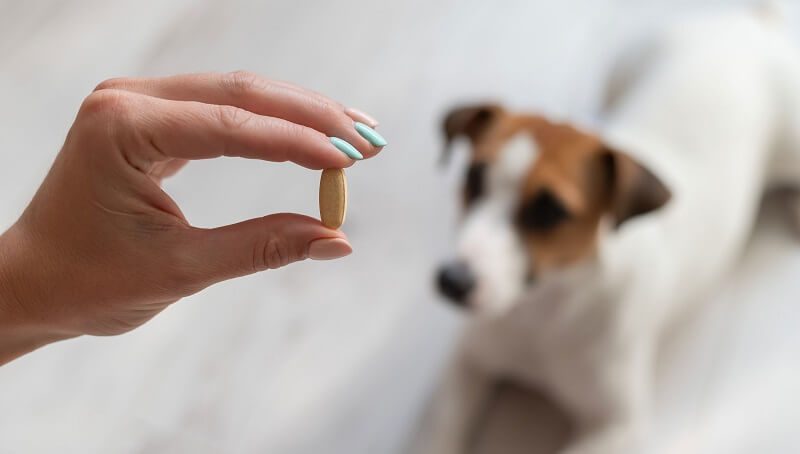Does your dog have digestive problems and refuses to eat? Prebiotics and probiotics for canines can help.
Does the dog often have digestive problems? Then prebiotics or probiotics for dogs may be the solution you need. I will explain how these substances can help your dog’s intestinal health and what to look for when administering them.
What are prebiotics and probiotics?
You might also like my articles about:
- How much yogurt to give a dog with diarrhea
- Mucus in dog poop
- What to do if a puppy has diarrhea but is still playful
Prebiotics and probiotics, from Latin “bios” = life, are dietary supplements. They can help dogs with digestive disorders or bowel diseases. In short, prebiotics and probiotics for dogs have a positive influence on the large bowel. However, how this happens depends on the type of substance.
Prebiotics for dogs – undigestible substances
Prebiotics are, by definition, undigestible substances such as carbohydrates, e.g., lactulose or fructooligosaccharide. They ensure that the bacterial intestinal flora, also called the microbiome, has enough food and develops better. Strengthened intestinal bacteria especially support the large intestine and have a health-promoting effect.
Prebiotics for dogs can only be administered in the form of high-quality dry or wet food. Prebiotic plants such as carrots, chicory roots, or artichokes are particularly common. Psyllium, Jerusalem artichoke, or apples have been shown to support intestinal flora.
Probiotics for dogs – living microorganisms
Unlike prebiotics, probiotics for dogs are already living microorganisms. If a dog ingests bacteria in the form of a food supplement, they restore the intestinal flora to a balance and help with digestion. Probiotics are commercially available only in the form of dietary supplements.
Good to know!
The combination of prebiotics and probiotics is called synbiotics. They combine the positive properties of various substances on the intestinal health of animals. Often, it is more logical to use this combination, because the active substances complement each other.
What are the functions of healthy intestinal flora?
 Normally, dogs’ nearly ten-meter-long intestines contain numerous bacteria, such as Enterobacteriaceae, e.g., Escherichia coli, which are very important for the intestinal health of the dog. Among other things, intestinal bacteria that are part of the intestinal flora perform the following tasks:
Normally, dogs’ nearly ten-meter-long intestines contain numerous bacteria, such as Enterobacteriaceae, e.g., Escherichia coli, which are very important for the intestinal health of the dog. Among other things, intestinal bacteria that are part of the intestinal flora perform the following tasks:
- They are an important part of the immune system and fight against pathogenic microbes.
- During their activity, they form important vitamins, e.g., vitamins B2, B12, and K, that the intestine can absorb through its mucous membrane.
- They break down undigestible food particles such as dietary fiber and short-chain fatty acids.
- They achieve the desired effect by metabolizing certain drugs.
- Carcinogenic and toxic substances are neutralized by some bacteria.
If the intestine is affected, the intestinal flora may die. This leads to the fact that the large bowel no longer works as usual. Affected dogs often suffer from diarrhea and nausea. They also lose their appetite and gradually lose weight.
When is it recommended to use prebiotics or probiotics in dogs?
If your dog’s intestinal flora is affected due to digestive disorders or bowel disease, you can strengthen intestinal bacteria with prebiotics and dog probiotics.
If your dog is suffering from diarrhea or flatulence, you can give him the supporting substances in his food. Veterinarians often recommend probiotics to dogs when they need to take antibiotics for a few days due to bacterial conditions.
Since antimicrobial drugs do not only eliminate disease-causing bacteria, but also intestinal bacteria belonging to the intestinal flora, probiotic or prebiotic agents are recommended to be offered to protect them.
However, you will generally need to keep in mind that dietary supplements, such as prebiotics or dog probiotics, should only be used in certain situations. If your dog is suffering from serious digestive problems, we recommend that you take him to a veterinarian first.
In all pet shops and veterinarian clinics you will find products suitable for prebiotics or probiotics, and even food for dogs with gastrointestinal diseases and diarrhea, if you want to change your pet’s current diet.
How long should prebiotics and probiotics be administered in dogs?
The period of administration depends on the underlying cause:
If your dog suddenly has a hard stool or diarrhea, it will often be enough to give him food supplements for a few days, or up to two weeks.
But if your pet suffers from a serious intestinal disease, for example, IBD, or inflammatory bowel disease, you will need to give him prebiotics or probiotics for several weeks. Consult with your veterinarian if you have any further questions and do not try to use human probiotics in dogs.
What we know is that prebiotics and probiotics in dogs have the following effects:
- They help digestion;
- They help the immune system;
- They provide intestinal benefits by producing fatty acids that inhibit harmful bacteria.
They can also:
- Treat diarrhea, irritable bowel, and intestinal inflammation;
- Prevent urinary tract infections;
- They reduce allergic reactions by decreasing intestinal permeability and controlling inflammation.
Are there any side effects?
Since probiotics are living intestinal bacteria, adding them to your dog’s diet is quite safe in general. An overdose will at best lead to the death of excess bacteria.
On the other hand, prebiotics should be used with caution, as pathogenic bacteria can also feed on carbohydrates. If they remove food from the intestinal flora, the latter can weaken even more.
Can you use probiotics on dogs with diarrhea?
Yes, probiotics can be used for dog diarrhea caused by:
- Stress colitis by transportation, movement, or any disruption to his routine.
- Sudden changes in your dog’s diet, such as eating new or unusual food.
- A bacterial imbalance from long-term use of antibiotics.
- Infections that cause excessive bacterial growth can also be eliminated with the use of probiotics.
Can puppies take probiotics?
Yes, puppies can take dog-specific probiotics. This will help them develop intestinal bacteria to support a healthy immune system and reduce the incidence of diarrhea, constipation, and digestive tract infections.
What can you do if you want to give your furry friend such a supplement?
First, a visit to the veterinary office is required. A routine veterinary checkup will help the veterinarian determine the best approach depending on the health of the dog. Your doctor may also recommend the dose, but also the best probiotic for your dog.




